In this article:
Cultivated largely in countries of Asia, Africa, and Central America, mangoes come in varying sizes and hues of yellow and green. They are considered stone fruits due to the presence of a large seed in their center.
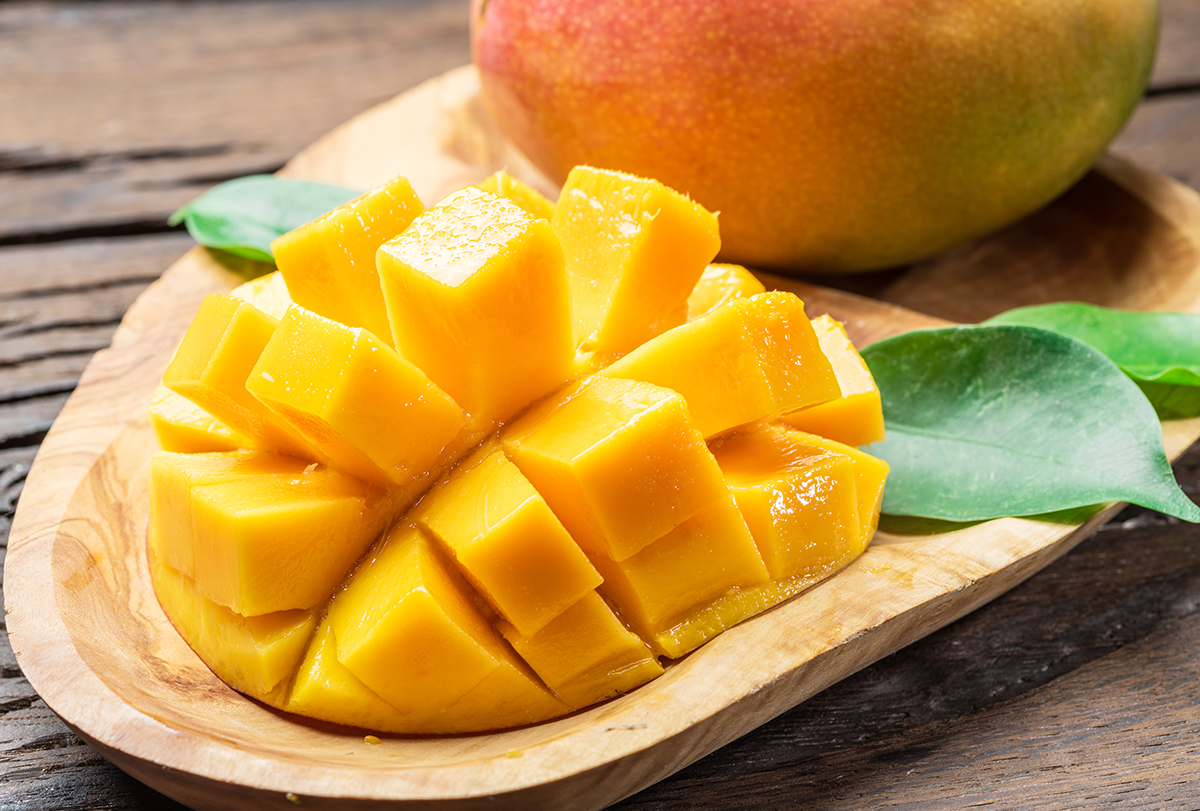
Mangoes are rich in polyphenols and many vitamins and minerals, and they are coveted for their several health benefits.
Not only that, the unique sweetness of the fruit makes it a favorite of many, irrespective of their age, and makes it easy to consume as part of a healthy diet and to tap into its health benefits. (1)
Nutritional Profile of Mango
One mango (216 g) contains about 126 calories, 31 g of carbohydrates, 3.4 g of fiber, and 175.3 g of water. It is abundant in vitamin A at 113.4 mcg, contributing to 13% of the daily requirement.
It also contains 1,344 mcg of beta carotene, 0.3 mg of vitamin B6 (which is 15% of the daily requirement), 90.3 mcg of folate (which is 23% of the daily requirement), 76.4 mg of vitamin C (which is 85% of the daily requirement), and 1.89 mg of vitamin E (which is 13% of the daily requirement).
It is also rich in minerals including copper (0.23 mg), potassium (325.8 mg), and magnesium (21 mg). (2)
In addition, it also has several bioactive polyphenols that act as good antioxidants.
Health Benefits of Mango
Here are the health benefits that mangoes have to offer.
1. Low in calories
Due to their high fiber, high water, and low calorie content, mangoes are a great snack to include as part of a weight loss diet. Mangoes are delicious, packed with nutrients, and versatile enough to fit into your diet in any form. (3)
According to a 2022 research, the consumption of fresh mango was found to be beneficial in reducing the risk of obesity and diabetes by improving satiety (feeling of fullness), thus preventing overeating and resulting in better blood sugar control after meals. (3)
Another study noted that the fiber in mango can increase satiety and keep one feeling full for longer, thereby preventing overeating, which is critical to weight management. (4)
2. Beneficial for diabetes
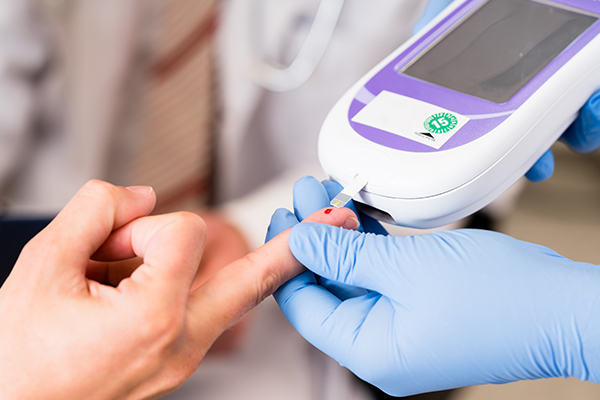
Mango consumption is a hot topic of debate among people with diabetes. While some people avoid the fruit due to its high sugar content, many nutritionists and doctors suggest including it in a healthy balanced diet.
Studies have shown mango consumption reduced blood glucose in people with obesity. (5)
It is suggested that the bioactive compounds present in mangoes, namely, gallic acid, chlorogenic acid, and ferulic acid, have antidiabetic effects and reduce blood glucose and insulin levels. (1)
It is pertinent to note that mangoes are high in sugar, and people with uncontrolled diabetes should include these in their diet only after consulting a doctor or dietitian.
3. Immune boosting properties
Mangoes are packed with nutrients useful in boosting immunity.
Vitamins A and C are associated with an improved immune response in the body. (6) Copper, folate, and vitamin B6 are also associated with improved immunity and the ability to fight infections. (6)
Consuming one mango per day can be useful in gaining protection from common infections and boosting immunity.
4. Keeps heart healthy
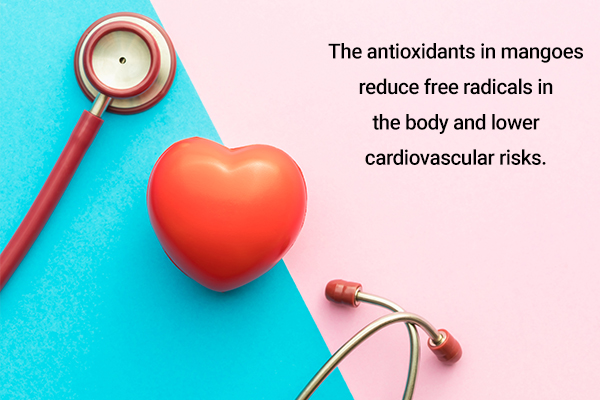
Fruits and vegetables rich in polyphenols are generally considered protective against cardiovascular diseases. (7) Vitamin C, carotenoids, and other polyphenolic compounds reduce the risk of cardiovascular diseases.
Mangiferin, a polyphenol in mango peel, seed, and kernel, was found to reduce the risk of heart attack in rats. The antioxidants in mangoes reduce free radicals in the body and lower cardiovascular risks. (8)
5. Good for digestive health
Fiber-rich foods such as mangoes (3) are good for gut health as they improve the biodiversity of gut microorganisms.
In one study, the addition of mangoes to a diet high in fat affected the gut microorganisms in mice, which improved gut tolerance to the consequences of a high-fat diet. (9) This effect is useful in improving lipid and glucose parameters to improve overall health.
Furthermore, fiber, which is present in mangoes, is useful in treating constipation that may be a result of irritable bowel syndrome. It adds bulk to the stool and helps in the easy passage of stool along the colon. (10)
6. Cholesterol reducer
In animal studies, mango leaf extracts were observed to exhibit cholesterol-lowering effects. (11)
Another study noted that adults fed with freeze-dried mango pulp had lowered glucose levels after eating and improved levels of good cholesterol. (12)
7. Eye health preserver
Carotenoids and their derivatives including lutein and zeaxanthin act as antioxidants that remove free radicals, which are responsible for causing damage to the retina. (13)
Mangoes, with their rich beta carotene content, may be beneficial in improving vision and maintaining eye health.
8. Skin friendly
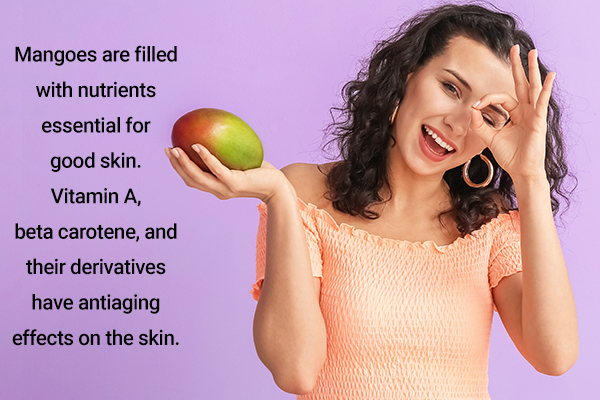
Mangoes are filled with nutrients essential for good skin. Vitamin A, beta carotene, and their derivatives have antiaging effects on the skin. (14)
Vitamin C, vitamin A, and beta carotene act as antioxidants that prevent skin damage and repair collagen in the skin. (14)
Copper, another nutrient abundantly found in mangoes, is mainly responsible for protecting the skin against damage, by forming an important antioxidant called superoxide dismutase. (14)
9. Cancer protective properties
Polyphenols and antioxidants are being widely studied for the role they may play in preventing the formation of cancer cells. (15)
Studies to evaluate the effectiveness of compounds in mango peel found their protective effect against most types of cancer cells. (16) Most studies, however, have been done on extracts of the peel and seed; therefore, the efficacy in humans and their dosages are still unclear.
How to Consume Mangoes
Mangoes are much-loved fruits. They can be consumed by themselves or included in smoothies, milkshakes, puddings, and salads. They are also great toppings on oatmeal.
Mango leaf is also consumed in the form of teas. A few leaves boiled in a cup of water make for a delicious mango leaf tea.
Supplements of mango extracts are also available; however, you must not consume any supplements without first consulting a doctor.
Precautions to Consider
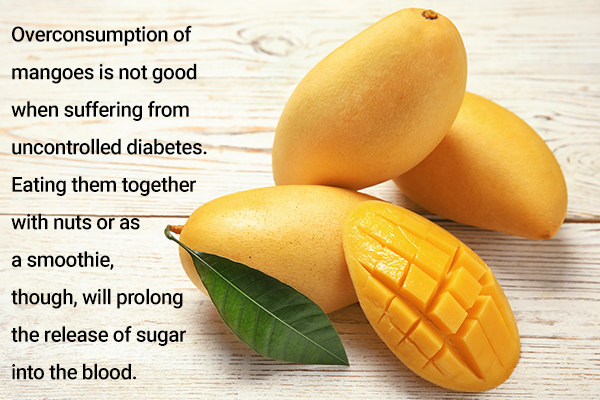
Mangoes are a delicious snack, but you must consider precautions when consuming them:
- In uncontrolled diabetes, mangoes should not be overconsumed. Eating them together with nuts or as a smoothie will prolong the release of sugar into the blood.
- Ayurvedic principles believe soaking mango in room-temperature water for 30 minutes will make the fruit easier to digest.
- People with allergies need to be careful with fruit consumption.
- Do not consume oversoft pulpy fruits as they may have already spoiled. Choose fruits that are firm to the touch.
Most-Asked Questions About Mangoes
How many mangoes should I eat every day?
Eating one mango per day is generally considered safe.
Can mangoes be eaten by pregnant women?
Mangoes are rich in folate, copper, and vitamins A and C. All these nutrients are essential in maintaining pregnancy and healthy fetal development.
Is it better to have dried mango instead?
Dried mangoes are a concentrated source of sugars. Eating 1–2 strips at a time is fine, but it is easy to overconsume these. So, it is better to eat the fresh fruit whenever available.
Final Word
Mangoes are a powerhouse of nutrients that are beneficial in many health conditions. Right from being a good source of antioxidants useful in maintaining eye and skin health to preventing heart diseases and lowering glucose and fat levels in the blood, mango can do it all.
Extracts from the peel and seeds are also being investigated for the role they may play in the fight against cancer. It is important to remember that natural foods are meant to be included as part of a healthy diet to maintain optimum health.
They are not meant to be used as medication or replacements for medicine for the treatment and management of chronic illnesses.
- Was this article helpful?
- YES, THANKS!NOT REALLY


